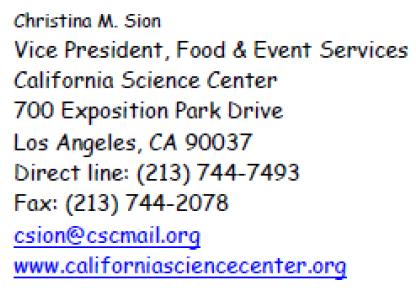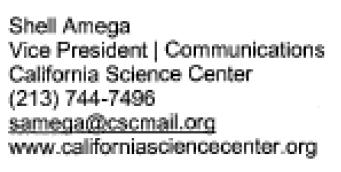 Free Speech
Free Speech
 Intelligent Design
Intelligent Design
California Science Center Plays Shell Game to Avoid Disclosing Public Records
As recently discussed on Evolution News, Discovery Institute has settled its lawsuit with the California Science Center (CSC). From our perspective, this is a very favorable settlement because (1) we are getting all of the documents we originally requested but they withheld, and (2) CSC is paying part of our court costs and attorneys’ fees. But now that the case has settled, the untold story is the pre-textual explanations that CSC made to rationalize why they refused to disclose public documents from certain employees, documents which might have shown evidence of CSC’s viewpoint discrimination against intelligent design (ID).
Our lawsuit filed last December alleged that “CSC has failed to provide a single document reflecting communications from decision makers at CSC who oversaw cancellation of the AFA Event, nor did CSC disclose any documents reflecting its communication with the Smithsonian Institution regarding this matter.” We then offered examples of communications from such decision makers which CSC had refused to disclose, including:
- “CSC’s October 6, 2009, communication from Chris Sion to the AFA notifying the AFA of CSC’s cancellation of the AFA Event”
- “communications involving CSC president and CEO Jeff Rudolph, which satisfy Discovery Institute’s October 9, 2009 CPRA Request, such as his October 5, 2009 communication with Shell Amega pertaining to the AFA event and the Smithsonian Institution”
On January 4, 2010, counsel representing CSC responded to our lawsuit by asserting that “Christina M. Sion, Shell Amega, and William Harris are not Center employees. Therefore, while the Center’s Response included communications which involve Foundation employees, including Ms. Sion, concerning the subject matter of the Request … it did not include documents that may be maintained by these Foundation employees themselves.” In other words, CSC is claiming that Chris Sion and Shell Amega don’t work for the California Science Center but for the California Science Center Foundation, a private entity not subject to the document requests under the California Public Records Act (CPRA).
To put it mildly, at least with regards to Sion and Amega, we have strong evidence which led us to believe that their arguments and assertions were sheer bluffs.

For example, CSC claimed Sion was merely a “Foundation employe[e],” even though she is advertised as “Vice President, Food & Event Services, California Science Center.” For example, see this online flyer from CSC which calls her, “California Science Center Vice President of Event Services, Chris Sion.” This also is seen in the signature found in many of Chris Sion’s e-mails:
Sion is not advertised as working for the Science Center’s Foundation; she’s listed as a vice president of the California Science Center itself. (Note: Actual Foundation employees, such as William Harris, DO advertise themselves as “Foundation” employees. For an example, see here.)

Likewise, Shell Amega is represented as “Vice President Communications, California Science Center,” as seen in the scan of her signature below:
Indeed, the California Science Center’s website is full of examples of pages that list Shell Amega as the media contact for the “California Science Center”–with no mention of her working for the “Foundation.” For just a few of many examples which list Amega as working for the “California Science Center,” see:
- CALIFORNIA SCIENCE CENTER TO HOST WEST COAST DEBUT OF AMERICA I AM: THE AFRICAN AMERICAN IMPRINT EXHIBITION
- CSC’s Media Room
- BODY WORLDS 2’s Final Farewell to Los Angeles
In these (and many other) examples, the California Science Center lists Shell Amega as a high-level media contact for the “California Science Center.” Yet when asked to provide public records pertaining to her actions at the publicly-operated museum, they conveniently claim Shell Amega doesn’t work for the California Science Center, but rather for the “Foundation.” These sorts of bogus and patently uncredible arguments take the notion of shell game to a new level.
CSC offered even less credible reasons for refusing to disclose all public documents from California Science Center’s President and CEO Jeff Rudolph. CSC’s counsel asserted that Mr. Rudolph is both “employed by both the Center and Foundation” and thus, allegedly, “The Center produced Mr. Rudolph’s correspondence responsive to the Request in his capacity as a Center employee … but did not produce any documents that the Foundation may have involving Mr. Rudolph in his capacity as a Foundation employee.”
While it’s true that Rudolph works for both the Science Center and the Foundation, CSC offered no principled reasons to explain their apparently arbitrary determinations as to why some e-mails from Rudolph were generated “in his capacity as a Center employee,” but others were “in his capacity as a Foundation employee.” The very fact that they resorted to such a non-credible arbitrary distinction shows they have no legitimate reason to justify withholding any communications from Rudolph that come under our request.
As we have seen with regards to Sion and Amega, even if Rudolph weren’t employed by the Foundation, CSC would have probably found some bogus excuse to withhold his e-mails. But the fact that CSC admits that Mr. Rudolph is a public, California State Employee of the California Science Center, means that CPRA is triggered. The CPRA states:
“The agency shall justify withholding any record by demonstrating that the record in question is exempt under express provisions of this chapter or that on the facts of the particular case the public interest served by not disclosing the record clearly outweighs the public interest served by disclosure of the record.” (§ 6255)
Yet CSC has not met its statutory burden to provide us with justification for withholding any communications from Mr. Rudolph that fell under our request. Their arbitrary assertion that e-mails generated by a public employee were not generated by an employee of a public-entity simply because that individual also works for a non-public entity (whose activities, in practice, are virtually indistinguishable from that of the public entity) does not “justify” withholding virtually all of that employee’s e-mails. It’s a pretext. Given the public’s strong interest in obtaining public documents, we felt that CSC’s arguments were a shell game contrived to skirt the law.
Thankfully, CSC chose to settle out-of-court. They admit no liability, but in the end we get the documents we requested, attorneys’ fees, and court costs. What’s unfortunate is that we had to go so far as to file a lawsuit to obtain these public records.
